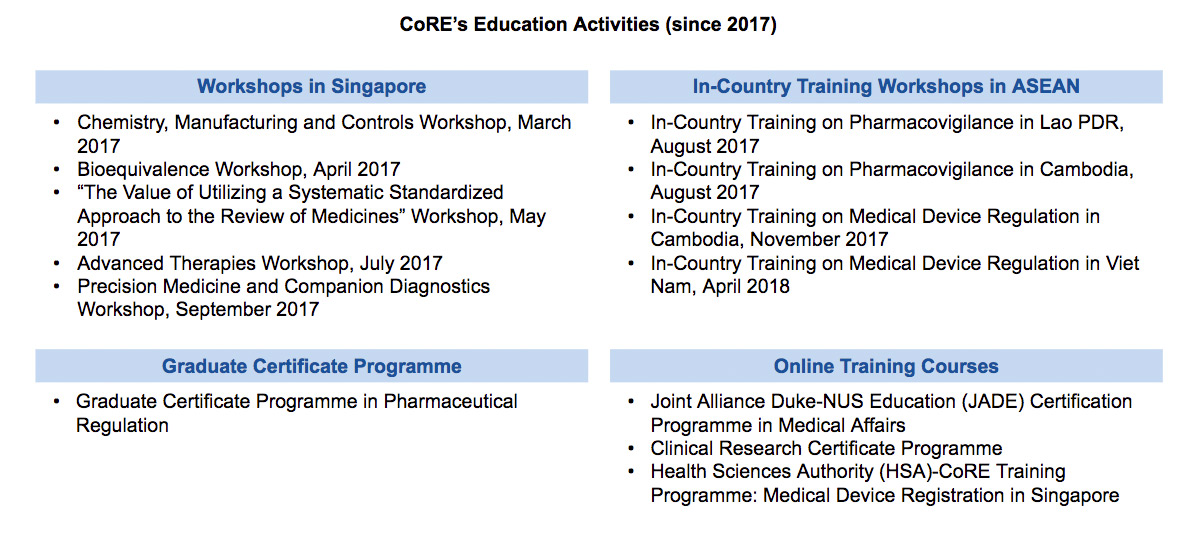Around The Globe
Driving Regional Regulatory Excellence in ASEAN
Silke Vogel
Associate Professor,
Centre of Regulatory Excellence,
Duke-NUS Medical School, Singapore
Hozanna Ngoh
Centre of Regulatory Excellence,
Duke-NUS Medical School, Singapore
ood regulation promotes better health. A robust health regulatory system enables timely access to good quality, safe, and efficacious health products. At the same time, such a system supports research innovation, encouraging development of health products (including medicines and medical devices) as well as facilitating industry access to market through effective and efficient regulatory processes. These basic principles are relevant and increasingly applicable to the ASEAN region.
Driving Regional Excellence in ASEAN
The Asia-Pacific region is characterized by a diversity of developing, emerging, and developed countries, which is also reflected in the varying levels of maturity and regulatory capacity of national regulatory authorities (NRAs) across the region. Within the Association of South-East Asian Nations (ASEAN), regulatory heterogeneity (i.e., country-specific requirements), inadequate regulatory knowledge and capacity, and the lack of innovation in regulatory science and policy pose significant challenges to NRAs and industry alike. It has been the goal of various international and regional bodies, such as the World Health Organization (WHO) and the Asia-Pacific Economic Cooperation (APEC) forum, to address these capacity issues, although sustaining such initiatives in the long run has proven to be difficult.
Since 2014, the Centre of Regulatory Excellence (CoRE) at the Duke-National University of Singapore Medical School has focused its efforts in promoting regional regulatory excellence in the Asia-Pacific, with a special focus in South-East Asia. CoRE’s strategic approaches include developing education and training programmes, fostering thought leadership, and promoting policy innovation.
In this article, we share two major lessons from CoRE’s experience: (1) partnering to drive sustainable change and (2) developing capacity building programmes that address identified needs.
Partnering for Sustainable Change
Strengthening regulatory systems is a resource-intensive effort and is practically impossible for a single organization to accomplish alone, given the limited available resources and expertise in developing countries. Regional collaboration among NRAs and like-minded partners helps to consolidate and coordinate plans, optimize resources, and open opportunities for wider regionalization outcomes.
From late 2015 to 2017, CoRE partnered with the Asian Development Bank (ADB) in a project aiming to support regulatory systems strengthening efforts, with a specific focus on eliminating malaria prevalence in the countries in the Greater Mekong Subregion (GMS). Although malaria elimination efforts in the GMS have been underway, progress has been hindered by the emergence of antimalarial resistance – a problem exacerbated by weak regulatory controls, giving way to the circulation of substandard and falsified antimalarial products, misdiagnosis, and inappropriate use of antimalarials. The two-year project has yielded several key outputs including a regulatory system profiling instrument (RSPI), country-specific and regional roadmaps for capacity building, and in-country training programmes to address identified capacity needs.
This collaboration featured strategic partnerships with the Asia-Pacific Leaders Malaria Alliance (APLMA) and WHO, including platforms such as the WHO Regional Regulatory Partnership, and WHO Coalition of Interested Partners for Regulatory Systems Strengthening. Such arrangements open opportunities for partners to extend activities arising from the project, such as the above outputs, setting the momentum for future work among wider networks.
Furthermore, this project helps to build on its existing work with other regional platforms, including the ASEAN Pharmaceutical Products Working Group (PPWG), ASEAN Medical Device Committee (AMDC), and the APEC Life Sciences Innovation Forum Regulatory Harmonization Steering Committee (LSIF RHSC).
Delivering Needs-Focused Programmes and Curricula
Education has been acknowledged as a key thrust towards strengthening regulatory systems by developing regulatory capacity and capability. It complements wider systems strengthening efforts by enhancing regulatory competencies and other critical skills pertinent to the regulatory profession, and it can be easily customized to address specific needs. Moreover, the drive towards regulatory excellence concerns not only regulatory affairs professionals in national regulatory authorities (NRAs) and industry but has also drawn considerable interest from stakeholders in the healthcare, scientific, and academic communities.
Education activities can take on multiple forms to cater to specific learning needs, such as formal certification programmes, workshops, and online training. (Some examples of CoRE’s education activities since 2017 are listed in the chart below.) While online training enables learning across geographic regions, onsite training allows learners to engage with experts and peers from around the world, adding value beyond the training itself. Our experience with conducting in-country training within the region has also indicated that the learning experience is improved with translation of the training content into the local language.
In line with the overarching goal to strengthen regulatory capacity and meeting the need for a structured regulatory training programme tailored to the Asian context, CoRE recently rolled out its Graduate Certificate programme in Pharmaceutical Regulation. Equipping the learner with basic to advanced competencies, the curriculum covers the full spectrum of regulatory topics across the entire product lifecycle, as well as fundamental principles governing good regulation and evolving regulatory trends. It is also a ‘stackable’ curriculum, offering flexibility for applicants to take on selected modules or ‘stack’ module completions to a full certificate.
Keep It Going: Measure, Review, and Adapt
Most importantly, it should be recognized that real, sustainable change is driven through holistic and long-term approaches. From wider regional capacity-building initiatives to targeted education and training programmes, stakeholders need to be committed to continuous monitoring of the various activities to measure outcomes, track progress, and review strategies and goals. Finally, amidst the rapidly evolving health and regulatory landscape, all players must be quick to respond and adapt to changing needs brought on by external shifts.
References available upon request.


